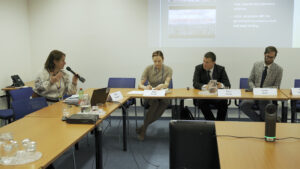Oppression can transform us in its own image and likeness in a thousand devious ways. Even when we fight against it. (The Hungarian original of this article is here!)
“Never react to an evil in such a way as to augment it,” said Simone Weil, the French philosopher and mystic. The real meaning of this sentence is revealed only to those who never cease to self-examine their souls. In fact, the evil rarely shows up in complete gear, as the horned, cloven-hoofed devil, who can be challenged openly to duel. In most cases, evil enters our lives with slow, insidious gradation.
“Imaginary evil is romantic and varied; real evil is gloomy, monotonous, barren, boring,” says Weil. It has the ability to transform us in his own image and likeness without us even noticing it. We often believe that we are still fighting against the Evil, while evil has already intruded to our hearts and our everyday lives. While we are trying to resist the Evil, we are actually feeding it.
According to the Russian poet Joseph Brodsky “what we regard as Evil is capable of a fairly ubiquitous presence if only because it tends to appear in the guise of good.” He never says “hi, I’m evil.” Neither good nature nor cunning calculation prevents it from penetrating our lives.
It is the same with tyranny. Oppression is not at its most frightening when it is exposed in its totality as terror, as Orwell says: a boot stamping on a human face. The most frightening is when oppression invisibly invades the factory, the office, the hospital, the school, the living room and the bedroom, with a benevolent smile on its face.
The first changes seem to be distant from our everyday lives. Laws, institutions, and slogans. Unwanted minorities are blamed for all social ills. The confines of public discourse are expanded by the day. At first, these changes may raise our eyebrows. We may even take to the streets to protest, depending on our temperament.
But a day will soon come when we wake up to realise that we are not even troubled any more by the lies flowing, spouting on us from all directions. From posters on the street, from articles in the press, and from posts in social media. On the tram, at the workplace, and in the store. It becomes ordinary. Normal. Part of the political landscape. We don’t even notice it and it is ingrained into our pores so much that we take it as self-evident as sweat in the heat, stampede on the bus. Uncomfortable, unpleasant, but we learnt to live with it.
And from here, only one step separates us from making minor or major compromises with oppression. I’d rather not speak up. I’d rather look the other way. I’m not going to post this article because I can get into trouble. Not in my position. And then, we’re not just tolerating things, but we’re doing them. After all, why not, if not me, then someone else will do it anyway. I’m just a little cog in the machine. I am just doing my job. I have a family to think about.
Primo Levi is right that monsters exist, but they are too few in number to be truly dangerous. More dangerous are the common men, the functionaries ready to believe and to act without asking questions. Or those who can simply look the other way when others act without questions.
Those who cannot be broken by threat are baited with flattery. The protagonist in Grossman’s novel, The Life and Fate, as a scientist, boldly stands up for scientific truth as long as power is threatening him, but is suddenly tamed by a personal phone call from Comrade Stalin, congratulating him on his work. How many people were subjected to tyranny by job offers, rewards, and contracts? There are some who can be forced into slavery with honeycomb instead of a whip.
And, of course, many people adopt a neutral posture. I am above this low-profile political mud-slinging, they say. This is one of the most hypocritical behaviors. As Elie Wiesel put it, neutrality always helps the oppressor, never the oppressed. Silence encourages the torturer, not the tortured. There is no neutrality under oppression.
And those who fight against oppression? The rebels, the warriors? They often deceive the world – and even themselves – that they completely resist the temptations of tyranny. Yet one of the most abominable qualities of tyranny is that it can transform us into its own image even as we fight against it. We do not realise that when we fight against power, our face reflects the distorted grin of evil. When fighting monsters, you can easily become one.
While we are wondering how it is possible that those millions of people, deceived by tyranny, are not able see the gigantic opinion bubble that shuts out reality, we do not realise that we often create a similarly big bubble around ourselves.
According to Joseph Brodsky, evil takes root when one man starts to think that he is better than another. We develop paranoid delusions, we fall into suspicion and despair. The noise of the battle makes us deaf to the truth. In the hatred of the tyrant, our hearts harden for love and compassion. And here the circle closes. The line of the Hungarian poet, Gyula Illyés is fulfilled: where there is tyranny, you yourself are tyranny.
And yet: et lux in tenebris lucet. The light shines in the darkness. Hannah Arendt says that humanity and brotherhood manifest themselves in their purest form in the darkest historical moments, among the most persecuted people.
Václav Havel is right that oppression is based on the illusion of the oppressed that it doesn’t matter what they do. That they are insignificant. Tyranny does not require that we believe in the lies with our full hearts – it is enough if we accept the lie as a reality. And so we become part of the lie. The power of the powerless, Havel says, is that they are not willing to live in a lie, they are not willing to become part the political landscape. They choose to live in the truth. They do not go to battle against the Evil in shiny armor, with a consecrated sword, but they search out evil in the banality of daily routine. Defying the anonymous, the inhumane and the impersonal power, we must rediscover trust, hope, openness, responsibility, solidarity, and love. This is bloody difficult, but everything depends on it.
Péter Sárosi






